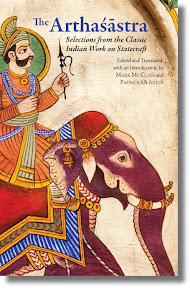Arthaśāstra
McClish, Mark [u.a.] [Übers.]:
The Arthaśāstra : Selections from the Classic Indian Work on Statecraft / ed. and transl., with an introduction, by Mark McClish and Patrick Olivelle. - Indianapolis, Ind. : Hackett Publishing Company, 2012. - lxxxiii, 169 S.
Einheitssachtitel: Arthaśāstra <engl.>
ISBN 978-1-60384-849-7
US$ 52,00 (Hardcover)
ISBN 978-1-60384-848-0
US$ 16,95 (Paperback)
DDC: 320.934
Beschreibung
The only extant treatise on statecraft from classical India, the Arthaśāstra is an invaluable resource for understanding ancient South Asian political thought; it also provides a comprehensive and unparalleled panoramic view of Indian society during the period between the Maurya (320–185 BCE) and Gupta (320–497 CE) empires.
This volume offers modern English translations of key selections, organized thematically, from the Arthaśāstra. A general Introduction briefly traces the arc of ancient South Asian history, explains the classical Indian tradition of statecraft, and discusses the origins and importance of the Arthaśāstra. Thorough explanatory essays and notes set each excerpt in its intellectual, political, and cultural contexts. [Verlagsinformation]
Inhalt
INTRODUCTION. ix
Authorship and Date. xi
Historical Context. xxi
Arthaśāstra: Text and Tradition. xxxiii
The World of the Arthaśāstra. xliii
CONTENTS OF THE COMPLETE ARTHAŚĀSTRA. lxxiii
SELECT BIBLIOGRAPHY. lxxxiii
SELECTIONS FROM THE ARTHAŚĀSTRA
Chapter One: How to be Good King. 1
1.1 Training of a King. 2
1.2 Taking Counsel. 8
1.3 Daily Routine. 10
1.4 Personal Security. 12
Chapter Two: The Kingdom. 17
2.1 Constituents of a Kingdom. 17
2.2 Construction of Fortified Cities. 19
2.3 Security of the Royal Residence. 25
2.4 Rules for the City. 27
2.5 Rules for Constructing Neighborhoods. 29
2.6 Settling the Countryside. 31
2.7 Protecting Against Calamities. 34
Chapter Three: Central Administration. 37
3.1 Appointments to the Central Administration. 39
3.2 Superintendents of Departments. 47
3.3 Revenue streams. 61
3.4 Treasury. 65
Chapter Four: The Judiciary. 71
4.1 Organization of Courts. 73
4.2 Valid Transactions and Transactors. 74
4.3 Judicial Procedure. 76
4.4 Titles of Law. 81
Chapter Five: Internal Security and Suppression of Criminal Activities. 97
5.1 Internal Secret Service. 98
5.2 Magistrates and Police. 110
5.3 Prisons and Jails. 117
Chapter Six: Foreign Affairs. 119
6.1 Circle Doctrine of States: Allies and Enemies. 120
6.2 Six Measures of Foreign Policy. 122
6.3 Envoys. 124
6.4 Foreign Secret Service. 126
Chapter Seven: War. 129
7.1 The Structure of the Army. 130
7.2 Military Expedition. 135
7.3 Battle Tactics. 140
7.4 Taking a Fort. 150
7.5 Conduct in Victory. 154
7.6 Conquering the Earth. 155
INDEX OF PASSAGES. 157
WORD INDEX. 161
Übersetzer
MARK MCCLISH is Assistant Professor of Religion at Birmingham-Southern College. Profile page.
PATRICK OLIVELLE is Professor of Sanskrit and Indian Religions and the Jacob and Frances Sanger Mossiker Chair in the Humanities at the University of Texas at Austin. Profile page.
Quellen: Hackett Publishing; WorldCat; Amazon; Google Books; Library of Congress
Rückschau
Von Patrick Olivelle haben wir in Indologica bereits die folgenden Werke erfaßt:
1. [21.06.2004] Olivelle: The law code of Manu (2 Titel)
2. [13.01.2005] Olivelle: Manu's Code of Law
3. [28.01.2006] Olivelle: Dharmasutra parallels
4. [30.04.2006] Olivelle: The five discourses on worldly wisdom
5. [17.08.2006] Olivelle: Between the Empires
6. [22.08.2006] Olivelle: Language, texts and society
7. [12.03.2008] Asvaghosa: Life of the Buddha
8. [28.11.2008] Olivelle: Collected Essays 1
9. [28.11.2008] Olivelle: Collected Essays 2
10. [13.11.2009] Olivelle: Dharma
11. [08.02.2010] Asoka
12. [20.02.2010] Law Code of Visnu
13. [25.04.2012] Reimagining Asoka
Von Mark McClish haben wir Indologica das folgende Werk erfaßt:
1. [28.05.2012] 2009 McClish: Political Brahmanism and the State
Ähnlich
- Olivelle: King, Governance, and Law in Ancient India
- Nationhood and Identity Movements in Asia
- Jayal: Citizenship and its Discontents
- Sevea: The Political Philosophy of Muhammad Iqbal
- Extremismus im Namen der Religion
- Die politischen und wirtschaftlichen Beziehungen zwischen der Europäischen Union und Indien
- Religious Freedom in India
- Brennpunkt Pakistan
- Muslimischer Nationalismus, Fundamentalismus und Widerstand in Pakistan
- Apocalyptic Realm

